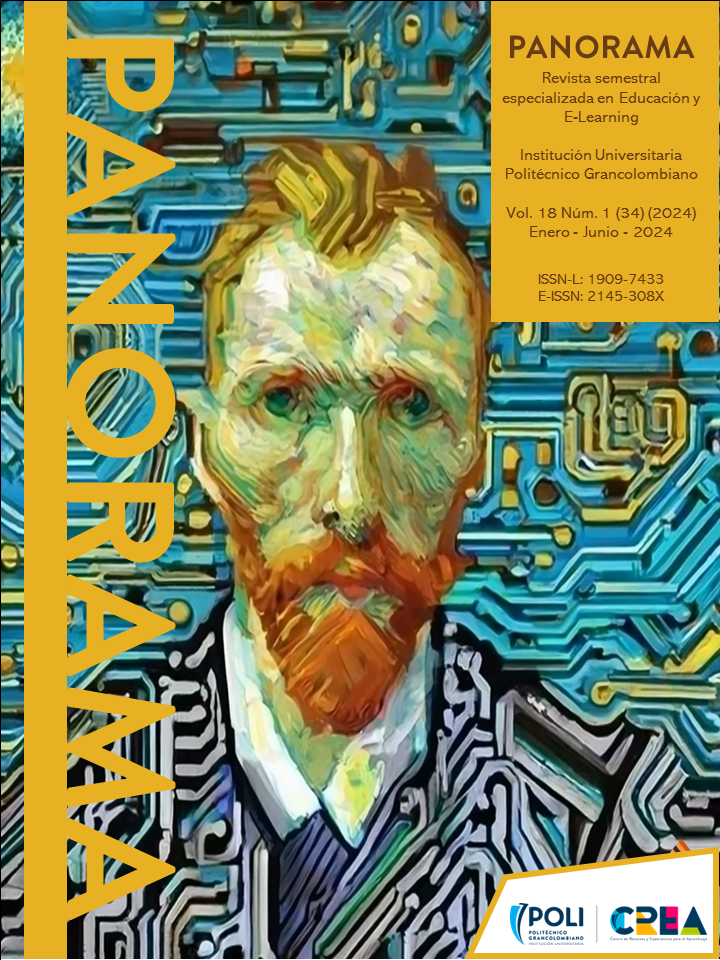Resumen
El objetivo de este artículo es evaluar una aplicación construida mediante Classcraft para el aprendizaje de técnicas de integración y determinar su efectividad en términos de aprendizaje y motivación de los participantes. La evaluación de la aplicación contribuye a la comprensión del potencial de los aplicativos lúdicos como herramientas didácticas efectivas. La metodología utilizada en la evaluación consistió en aplicar una encuesta a los participantes para recopilar información sobre su experiencia con la aplicación. La encuesta consistió en preguntas cualitativas, donde los aspectos evaluados incluyeron la percepción del diseño del aplicativo, el carácter formativo del mismo, así como preguntas abiertas que permitieron a los estudiantes expresar aspectos positivos y áreas de mejora. Los resultados de este trabajo indican que la aplicación tuvo una buena acogida por parte de los participantes, la mayoría de ellos experimentaron una evaluación positiva, menor tensión, claridad en el desarrollo de los ejercicios, adquisición de nuevos conocimientos, motivación y desarrollo de habilidades. En conclusión, los resultados de la evaluación respaldan la percepción positiva de los participantes hacia el tema de integración y demuestran el potencial de los aplicativos lúdicos, como herramientas didácticas efectivas. Estos hallazgos sugieren que la gamificación es una estrategia prometedora para mejorar la evaluación, el aprendizaje y la motivación en el contexto de la enseñanza de técnicas de integración.
Referencias
Álzate Gallego, Y., & Parra Bernal, L. R. (2022). Competencias digitales en docentes de educación superior En: Daza-Orozco, C. E., Norman-Acevedo, E., Cera-Ochoa, R. A., & Acosta-Triviño, R. (Eds). Experiencias de investigación inspiradoras. Iniciación Científica. 93–106. https://doi.org/10.15765/librosic.v1i1.11
Bado, N. (2022). Game-based learning pedagogy: a review of the literature. In Interactive Learning Environments (Vol. 30, Issue 5, pp. 936–948). Routledge. https://doi.org/10.1080/10494820.2019.1683587
Bovermann, K., & Bastiaens, T. J. (2020). Towards a motivational design? Connecting gamification user types and online learning activities. Research and Practice in Technology Enhanced Learning, 15(1). https://doi.org/10.1186/s41039-019-0121-4
Byusa, E., Kampire, E., & Mwesigye, A. R. (2022). Game-based learning approach on students’ motivation and understanding of chemistry concepts: A systematic review of literature. In Heliyon (Vol. 8, Issue 5). Elsevier Ltd. https://doi.org/10.1016/j.heliyon.2022.e09541
Çakıroğlu, Ü., & Güler, M. (2021). Enhancing statistical literacy skills through real life activities enriched with gamification elements: An experimental study. E-Learning and Digital Media, 18(5), 441–459. https://doi.org/10.1177/2042753020987016
Cezar, V., Garcia, P., Botelho, V., & Miletto, E. (2019). Towards an RPG Game to Teach Calculus. 2019 IEEE 19th International Conference on Advanced Learning Technologies, 116–118. https://doi.org/10.1109/ICALT.2019.00037
Chan, K., Wan, K., & King, V. (2021). Performance Over Enjoyment? Effect of Game-Based Learning on Learning Outcome and Flow Experience. Frontiers in Education, 6. https://doi.org/10.3389/feduc.2021.660376
Garcia-Cabot, A., Garcia-Lopez, E., Caro-Alvaro, S., Gutierrez-Martinez, J. M., & de-Marcos, L. (2020). Measuring the effects on learning performance and engagement with a gamified social platform in an MSc program. Computer Applications in Engineering Education, 28(1), 207–223. https://doi.org/10.1002/cae.22186
Greipl, S., Klein, E., Lindstedt, A., Kiili, K., Moeller, K., Karnath, H. O., Bahnmueller, J., Bloechle, J., & Ninaus, M. (2021). When the brain comes into play: Neurofunctional correlates of emotions and reward in game-based learning. Computers in Human Behavior, 125. https://doi.org/10.1016/j.chb.2021.106946
Jääskä, E., & Aaltonen, K. (2022). Teachers’ experiences of using game-based learning methods in project management higher education. Project Leadership and Society, 3. https://doi.org/10.1016/j.plas.2022.100041
Jurgelaitis, M., Čeponienė, L., Čeponis, J., & Drungilas, V. (2019). Implementing gamification in a university-level UML modeling course: A case study. Computer Applications in Engineering Education, 27(2), 332–343. https://doi.org/10.1002/cae.22077
Kalogiannakis, M., Papadakis, S., & Zourmpakis, A. I. (2021). Gamification in science education. A systematic review of the literature. Education Sciences, 11(1), 1–36. https://doi.org/10.3390/educsci11010022
Kao, M. C., Yuan, Y. H., & Wang, Y. X. (2023). The study on designed gamified mobile learning model to assess students’ learning outcome of accounting education. Heliyon, 9(2). https://doi.org/10.1016/j.heliyon.2023.e13409
Krath, J., Schürmann, L., & von Korflesch, H. F. O. (2021). Revealing the theoretical basis of gamification: A systematic review and analysis of theory in research on gamification, serious games, and game-based learning. Computers in Human Behavior, 125. https://doi.org/10.1016/j.chb.2021.106963
Liu, T., & Israel, M. (2022). Uncovering students’ problem-solving processes in game-based learning environments. Computers and Education, 182. https://doi.org/10.1016/j.compedu.2022.104462
Magreñán, Á. A., Jiménez, C., Orcos, L., & Roca, S. (2022). Teaching calculus in the first year of an engineering degree using a Digital Escape Room in an online scenario. Computer Applications in Engineering Education. https://doi.org/10.1002/cae.22568
Margalit, T., Rosenzweig, L., Stanchescu, Y., & Gabel, M. (2021). Utilizing Gamification in Mathematics Courses for Engineers to Promote Learning. Proceedings of the 17th International CDIO Conference, 1–12.
Mésquida, A. (2021). Strengthening Motivation in the Mathematical Engineering Teaching Processes – A Proposal from Gamification and Game-Based Learning. International Journal of Emerging Technologies in Learning, 16(6), 4–19. https://doi.org/10.3991/ijet.v16i06.16163
Nousiainen, T., Kangas, M., Rikala, J., & Vesisenaho, M. (2018). Teacher competencies in game-based pedagogy. Teaching and Teacher Education, 74, 85–97. https://doi.org/10.1016/j.tate.2018.04.012
Rahman, M. A., Sook Ling, L., & Yin, O. S. (2022). Interactive Learning System for Learning Calculus. F1000Research, 11, 307. https://doi.org/10.12688/f1000research.73595.1
Rincon-Flores, E. G., & Santos-Guevara, B. N. (2021). Gamification during Covid-19: Promoting active learning and motivation in higher education. Australasian Journal of Educational Technology, 37(5), 43–60.
Rincon-Flores, E. G., Gallardo, K., & Fuente, J. M. de la. (2018). Strengthening an Educational Innovation Strategy: Processes to Improve Gamification in Calculus Course through Performance Assessment and Meta-evaluation. International Electronic Journal of Mathematics Education, 13(1). https://doi.org/10.12973/iejme/2692
Tay, J., Goh, Y. M., Safiena, S., & Bound, H. (2022). Designing digital game-based learning for professional upskilling: A systematic literature review. Computers and Education, 184. https://doi.org/10.1016/j.compedu.2022.104518
Velasco, N., Karen, C., Morales, M., & Mendoza, D. (2022). Interactive mockup to calculate arc length using integrals. Journal of Physics: Conference Series, 2346(1). https://doi.org/10.1088/1742-6596/2346/1/012005
Wilches-Tinjacá, J. A., Salamanca López, M. E., & Daza-Orozco, C. E. (2023). Todo tiempo pasado (no) fue mejor: Educación para el futuro y tecnologías posthumanas en el redimensionamiento de lo público-privado. Editorial Politécnico Internacional, 223–245

Esta obra está bajo una licencia internacional Creative Commons Atribución-NoComercial-SinDerivadas 4.0.
Derechos de autor 2024 Panorama





